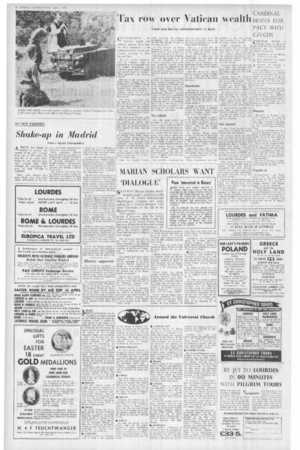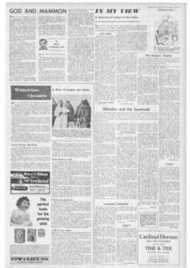Page 2, 2nd April 1965
Page 2

Report an error
Noticed an error on this page?If you've noticed an error in this article please click here to report it.
Tags
Share
Related articles
Vatican Status Review
£2,000 M. Investments By A Staff Reporter T He Newly...
Film Row
" Inevitable War"
Liberation Theology Faces New Challenge
Tax row over Vatican wealth
FROM OUR SPECIAL CORRESPONDENT IN ROME CENSORSHIP, the Vatican's wealth, and political jealousy hae been the chief ingredients in the boiling pot in the current controversy involving the 1 loly See and Italy.
The row. mainly concerned with the Vatican's rights as stipulated in its Concordat with the Italian government, has aroused a great deal of feeling and caused many to wonder: "How powerful is the Catholic Church?"
Deputies of the extreme LeftWing Italian Socialist Party of Proletarian Unity (PS1UP). formed by breakaway members of the Socialist Party. have introduced a motion in Parliament calling for a complete revision of the Concordat hetween the Vatican and the Government.
The move. which came after the sensational prohibition of the play The Representative in Rome, has been denounced as an attempt to cause friction in the coalition government. comprising Socialists. Christian Democrats. Social Democrats and Republicans.
The banning of the play. which attacks the late Pope Pius XII for not speaking out against Nazi persecution of the Jews, was justified under the Lateran 'Treaties of 1929 -signed by Italy and the Vatican.
A statement in the Senate by the Socialist Party Whip. Signor Giusto Tolley, saying there was "no question, on the plane of political action, of a revision of the Concordat" may. however, have helped to cool this particular controversy for the time being.
The other big sore point has been the position of the Vatican in regard to taxes due—or not due— to the Italian State.
Under the Lateran Treaties. which lecognised the Vatican's St.', ereignty, Italy acknowledged that the Holy See did not have to pay taxes to Italy.
In 1962. however. the Italian Parliament passed a law taxing profits made in stock transactions. This law imposed a 15 per cent withholding tax on share dividends hich was later raised to 30 per cent. An amendment by the Christian Democrats ss hich would have exempted Vatican shares from the tax was opposed by the then Finance Minister, Signor Gieuseppe Trabucche a Christian Democrat himself. and was dropped.
A series of diplomatic exchanges between the Vatican Secretary of State, Cardinal Cicognani, and the Italianpovernment followed, and in the end the matter was quietly settled. Signor Mario Martinelli. the new Finance Minister in the all-Christian Democrat stop-gap Cabinet in 1963. sent a confidential circular to the Italian companies in which the Vatican held shares authorising them to pay dividends free of tax to the Vatican. This circular has been a source of friction since the Socialists rejoined the coalition government.
Tax refund
Now the whole subject has exploded in the row over the Lateran treaties which the PSIUP is trying to have revised. Also contributing to the flare-up is the fact that another Bill has been proposed which seeks to ensure that the Holy See is not only exempt from taxation on dividends. but that it should be given a refund of certain taxes claimed in the past.
The Leftist R o rn e weekly l'Espresso recently claimed that this agreement would cost the Italian fiscal system about £23 million — a figure ahich has been generally ridiculed.
But. inevitably. speculation has been rife once again as to the extent of the Vatican's riches. and how big a shareholder it is on the Italian Stock Exchange.
There is no doubt that the money paid by the Italians to the Vatican under the Lateran Treaties, in compensation for finally abandoning its rights over the Papal States, has been wisely and rewardingly invested. The payments in Italian banknotes and government bonds, were to a nominal value of about £19 million at that time.
Pope Pius XI set up a special body to invest this money throughout the world. and the capital's increase is believed te have been spectacular_
Shareholder
The Vatican is also a very large shareholder in Italy. Estimates of its exact holdings have been many and varied. but a conservative one is that the Holy See controls between 7 and 10 per cent of the Italian economy.
Among its interests in Italy are believed to be banks. a spaghetti factory, the Italian airlines, a big property company. public utility firms. and a film company.
Prince Giulio Pacelli. a nephew of the late Pius XII. is a director of the Banco di Roma, one of Italy's three "banks of national interest". and of the Societa Italiana per it Gas, a public Utility company.
His brother. Prince Marcantonio. is chairman a the hoard of directors of the, Pantanella Spaghetti Factory and a director of the Societe Generale Immobiliare. one of Italy's leading property companies.
Both these men hold several honorary posts in the Vatican. and their brother. Prince Carlo Pacelli. is Councillor-General of the Vatican City State.
Prince Marcantonio was also president of the LAI airlines. which merged in the 1950s with the Italian airlines Alitalia.
Widely mentioned. too. as Vatican-controlled is the Banco di Santo Spirito, set up in 1605 by Pope Paul V and transformed into a limited company in 1923. The president of the bank is Marquis Giovanni Battista Sacchetti. Quartermaster General of the Apostolic Palaces.
Also controlled by the Holy See is a Rome film company. San Paolo Film, which has been making religious films since the 1930s. mostly fmchildren.
Outside Italy. the Vatican's investments represent about 90 per cent of its total holdings, These are generally channeled through
Fribourg in SN5 itzerland. and through New York under the sponsorship of Cardinal Spellman.
An article in The Economist last week described the Vatican ."or rather the Pope, for his rule is absolute" as far and away the world's biggest shareholder, with a portfolio of quoted securities totalling more than £2,000 million.
It also points out that this estimate takes no account of the Vatican's additional wealth. front land and real estate all over the world to the world's most valuable art collection.
Not misused
IL adds: "Even Christie's would surely quail at putting the Sistine Chapel under the hammer."
The Vatican wealth has often been the target of criticism, some of it bitter. But the money is not misused. During the last war. and immediately after it, millions of Italians were given food and clothing from the fleet of P.O.A. (Pontifical Relief Organisation) lorries, and about 85.000,000 are reported to be on its regular relief list. It is also active at times of floods and other emergencies.
Other funds are used to help poverty-stricken parishes and to relieve poverty and famine throughout the mould. Ftneign missions also receive huge sums every year. and other expenditures in similar directions eat up the Vatican'e income.
Meanwhile the speculation, arguments and bitterness go on, both about The Represeniative, now playing in the North of Italy, and the taxes question. The Concordat is unlikely to be changed, at least not tie some time. But the prohibition in Rome of Ralph Hochhuth's controversiel play has set off a chain reaction destined to catch the attention or the 'Amid.
blog comments powered by Disqus











